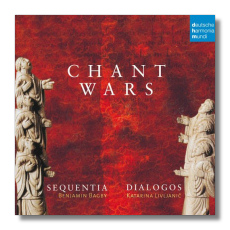
The Internet's Premier Classical Music Source
Related Links
- Latest Reviews
- More Reviews
-
By Composer
-
Collections
DVD & Blu-ray
Books
Concert Reviews
Articles/Interviews
Software
Audio
Search Amazon
Recommended Links
Site News
 SACD Review
SACD Review
Chant Wars

- Gregorius praesul
- Ad Dominum dum tribulaer
- In convertendo Dominus
- Venite, populi
- Domine, exaudi
- Natus ante saecula
- Alleluia: Prosechete laos
- Saepe expugnaverunt
- Deus enim
- Laudate Dominum Deum nostrum
- A solis ortu
- Collegerunt pontifices
- Christus vincit
Sequentia/Benjamin Bagby
Dialogos/Katarina Livljanic
Deutsche Harmonia Mundi 82876-66649-2 Hybrid Multichannel SACD 75:25
The title of this CD should be taken figuratively; it is unlikely that hoards of monks ever rushed into battle with each other, beating each other with sacred books - a Monty Pythonish idea! This CD's subtitle is, "The Carolingian 'globalisation' of medieval plainchant." This refers to the efforts of Charlemagne in the 9th century to standardize liturgical plainchant and how it was realized throughout his empire. Katarina Livljanic refers to Charlemagne's reform of plainchant across much of Europe as a kind of "cultural revolution." As with most revolutions, it was not absolute, and many localized chant traditions persisted for centuries, mixing with others and evolving over time. When we think of chant, we almost automatically add the word "Gregorian" in front of it - a reference to Pope Gregory I, but that is too simplistic. As this fascinating disc reminds us, over its long history, Christian plainchant was characterized by diversity, change, and regional variations, not by homogeneity.
Most of the time, when we hear "Gregorian chant," we hear long stretches of unison singing. There's certainly some of that on Chant Wars - and it is beautifully performed - but Sequentia and Dialogos go beyond that. You don't expect to hear harmony on a program of liturgical chants, nor do you expect to hear a woman's voice, but you will hear both here. In "Christus vincit," an example of plainchant straight from the tradition of Charlemagne, you'll also hear an example of "call-and-response" chanting that is so cumulatively powerful that it will grab you by the ears and not let go. For the most part, these innovations are based on conjecture; there are few medieval sources to rely on for suggestions on performance practice. Livljanic admits that intuition has played a role in deciding how these plainchants were to be performed. It is possible that some of them remained unchanted for more than a millennium before Sequentia and Dialogos resurrected them.
Make no mistake: this is a thoroughly engaging program, and a startlingly beautiful one too. Scholarship and creativity have entered into a perfect marriage; there's none of the opportunism of the brief chant craze from the 1990s (remember that?), but neither is there a dull adherence to questionable performance traditions. The music comes alive, and if you close your eyes, you will be transported to medieval Europe, and brought into an intensity of spirituality that will transfix you, regardless of your religious beliefs. What older chant programs promised, this one delivers.
Chant Wars was recorded in the French Abbey of Fontevraud, which was founded in 1101. In a sense, it is as much a part of this recording as the human performers are, given the luscious reverberation in the grand réfectoire. Livljanic's Booklet notes are very informative, and there are Latin texts and translations as well.
Astonishing.
Copyright © 2005, Raymond Tuttle




















